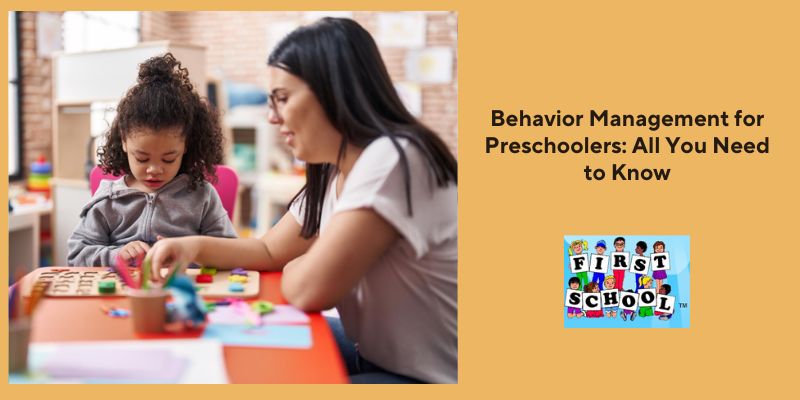



Behavior management in early childhood education plays a pivotal role in shaping your child's development and learning experience. It involves employing strategies and techniques to positively guide children's behavior, promoting a conducive social growth and academic readiness environment.
Read on to explore the essential aspects of behavior management for preschoolers, the common behavioral problems, effective intervention methods, and best practices in early childhood education.
Behavior management encompasses a range of strategies to promote desirable behaviors and address challenging behaviors in young children. Effective behavior management in preschool involves creating a structured and supportive environment where children can learn and interact positively with peers and adults. It focuses on teaching children self-regulation, social skills, and appropriate ways to express their emotions.
Effective behavior management offers numerous benefits for preschoolers:
When children feel secure and understood, they're more likely to be engaged in learning activities and interact positively with others.
Learning to manage emotions, handle conflict, and express needs appropriately is crucial for healthy social development.
Positive reinforcement encourages self-confidence and helps children feel good about themselves.
Clear expectations and predictable routines minimize confusion and frustration, leading to a calmer learning environment.
Several behavior problems in preschoolers are common, including:
Frustration, fatigue, or a lack of understanding can lead to outbursts of crying, screaming, or stomping.
Hitting, biting, or pushing can be a way for children to communicate their needs or express frustration.
Refusing to follow instructions or listen to directions can signify defiance or a need for attention.
Some children may experience anxiety when separated from their parents or caregivers.
Excessive energy and difficulty focusing can be challenging for children and adults.
Handling behavior problems in preschool requires a proactive and positive approach. Here are specific methods to encourage positive behavior and discourage negative behavior:
Acknowledge good behavior with specific compliments (e.g., "Wow, you shared your blocks with Sarah! That was kind!").
A high five, handshake, or hug can show appreciation for positive choices.
To celebrate achievements, use stickers, small prizes, or privileges (e.g., choosing the next story) sparingly.
Use short, clear sentences that children can understand.
Instead of "Don't run," say "Use walking feet inside."
Enforce expectations consistently across settings (home and school).
Use pictures to illustrate expected behaviors (e.g., a picture of a child raising their hand next to "Ask permission to speak").
Visual schedules with pictures or icons help children anticipate transitions and routines.
Use a green, yellow, and red system to signal appropriate behavior levels (green = good, yellow = warning, red = consequence).
Allow children to experience the natural outcome of their choices (e.g., not picking up toys means playtime ends).
For repeated negative behavior, remove a privilege (e.g., not choosing an activity) but ensure it's related to the behavior.
Help children find ways to fix the problem they created (e.g., spilled juice? Get a rag to clean it up).
When a child exhibits negative behavior, suggest a more appropriate activity (e.g., feeling frustrated? Let's build a tower with blocks!).
Redirect attention to a new activity that interests the child.
Use a song, story, or game to shift their focus away from the negative behavior.
A comprehensive behavior management system combines various approaches to create a supportive and structured environment. One effective framework is:
Focuses on teaching and reinforcing positive behaviors through consistent routines, clear expectations, and regular positive reinforcement.
This system also collects data on children's behavior to identify patterns and develop targeted interventions.
Targeted interventions can help children who exhibit challenging behaviors. These might include:
Developing specific plans that address the unique needs of each child.
Teaching children how to interact positively with peers.
Helping children learn to manage their emotions through techniques like deep breathing and self-talk.
Engaging parents in the behavior management process to ensure consistency between home and school.
Early childhood programs follow specific guidelines to ensure consistent and effective behavior management. These typically include:
Establishing and communicating clear behavior policies to staff, children, and parents.
Providing regular training for staff on behavior management techniques and strategies.
Continuously monitoring children's behavior and evaluating the effectiveness of interventions.
Ensuring behavior management strategies are inclusive and respectful of all children's needs and backgrounds.
Here are some engaging activities to teach and reinforce positive behavior:
Act out situations where children can practice resolving conflicts or healthily expressing emotion, allowing children to practice positive behavior in a safe environment.
Reading stories emphasizing positive behavior and discussing with the children.
Visual charts are used to track and reward positive behavior.
Encouraging cooperation and teamwork through group activities and games.
Effective behavior management for preschoolers is essential for creating a positive learning environment and supporting children's social-emotional development. By understanding common behavior problems, implementing comprehensive behavior systems, and using targeted interventions, educators can help preschoolers develop the skills they need to succeed. First School offers a nurturing environment where these principles are implemented, making it an excellent choice for your child's early education.
Ready to provide your child with a supportive and structured early learning environment? Enroll at First School today and see the difference effective behavior management can make in your child's development.
Contact us now to learn more about our programs and how we can support your child's growth and success.